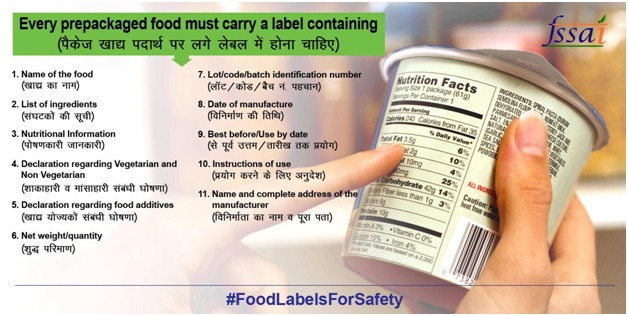
The Food label requirements of India
“Labeling means to introduce a product for sale by providing comprehensive information about the product to the target consumer market besides ensuring safety standards of the regulatory body. A useful elaborated information about the label leaves good impression on the consumers seeking required details about the product”
Food Labeling serves as a primary link of communication between the manufacturer or packer of food on the one hand and distributor, seller, and user or consumer on the other hand. By way of labeling the manufacturer introduces his product to his distributor or seller and to the target consumer or user of his product by providing all the information regarding his product on the label.
The manufacturer can impress the consumer or its target user that it is the product of his choice, which suits him/her according to his/her needs. Thereby, the correct and required labeling undoubtedly promotes the sale of his product.
As per Food Laws every packaged food article has to be labeled and it has to be labeled in accordance to the law applicable in the country of the user. Every packaged food article for the domestic use has to be labeled in accordance to the related Indian Food Law i.e. Food Safety and Standards (Packaging and Labeling) Regulations, 2011, notified by Food Safety and Standards Authority of India (FSSAI).
The packaged food for export has to be labeled in accordance to the food laws and regulations applicable to the importing country.
In order to safe guard the interest of the consumer, The Food Safety and Standards (Packaging and Labelling) Regulations, 2011, provides that every packaged food article has to be labeled and it shall provide the following information –
- The name of Food.
- List of Ingredients.
- Nutritional Information,
- Declaration regarding Veg or non-veg.
- Declaration regarding Food Additives.
- Name and complete address of the manufacturer or packer.
- Net Quantity.
- Code No./Lot No./Batch No.
- Date of manufacture or packing.
- Best Before and Use By Date.
- Country of Origin for imported food and
- Instructions for use
In addition to the above information the manufacturer or the packer has to also ensure that the label complies with the general requirements of labeling prescribed under the regulations I.e. the label should not become separated from the container, contents on the label shall be correct, clear and readily legible and shall be in English or Hindi language, etc.
It is very easy to notice the defect in labeling through visual inspection and there is no need to send the sample for analysis and no analysis report is required to identify the labeling defects. If the food product is not labeled in accordance to the regulations or it does not provide the required complete information or the food product is promoted for sale with false, misleading or deceptive claims then it is considered as misbranded food and attracts the penalties as given below-
OFFENCES & PENALTIES
- Misbranded Food Up to 3lakh rupee
- Misleading advertisement Up to 10lakh rupees
The consumer can notice the labeling defect easily through visual inspection and that may create suspicion about the quality of the product also in the mind of the consumer.
If during food inspection the regulator notices any labeling defect then it creates doubt in the mind of the regulator about the quality of the food product also and invariably the sample of such food product is taken and sent for analysis for the check of its quality also.
If on analysis the sample is found non-complying to the standards then the food product is declared as substandard besides misbranding and prosecution is launched for substandard and also for misbranding i.e labeling defect. Even if the sample is found confirming to standards, the prosecution is launched for misbranding.
From the above discussion, it is clear that on one hand the correct and appropriate labeling convince the user that it is the product for him/her and he/she should buy it and indirectly promotes the sale of the product. On the other hand incorrect and incomplete labelling makes the food product misbranded, suspicious of its quality and attracts the attention of the regulators for its quality check and further leads to prosecution.
In view of above, the Food Business Operator can understand the importance of correct labelling and if the label declaration is incorrect and not in accordance to the regulations then the FBOs have to face the implications of the FSS acts.
The Food Business Operator is responsible for providing the correct and requisite information on the label to the consumers. Considering the importance of correct labeling, We have made this course for awareness of the Food Business Operators on labeling of packaged food products in accordance to food Safety and Standards (Packaging and Labeling) Regulations, 2011,notified by FSSAI which is effective in India w.e.f. August 5, 2011.
This Packaging and Labeling Regulations are summarized in the following modules:
- General Requirements and Manner of Labeling.
- The name of Food and List of Ingredients.
- Nutritional Information.
- Declaration regarding Veg or Non-veg.
- Declaration regarding Food Additives.
- Name of Manufacturer or packer and Country of Origin.
- Net Quantity.
- Lot No. /Batch No./Code No.
- Date of manufacture or packing and Best Before or Use By Date.
- Instructions for Use.
- Specific Requirements and Manner of Labeling for Infant Milk Substitute and Infant Foods.
- Specific Labeling Requirements of edible oils and fats, permitted food colors and irradiated foods.
- Specific Requirements and Manner of Labeling of Other Food Products.
- Specific Restrictions on product labels and advertisement.
- Exemptions from labeling requirements.
Author: Sumana Rao | Posted on: April 7, 2015






















Write a comment